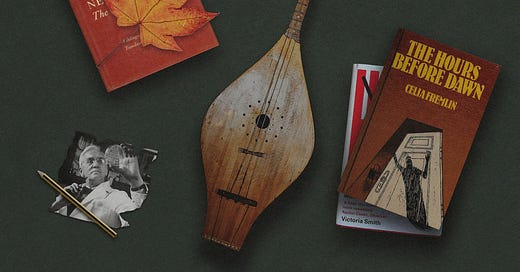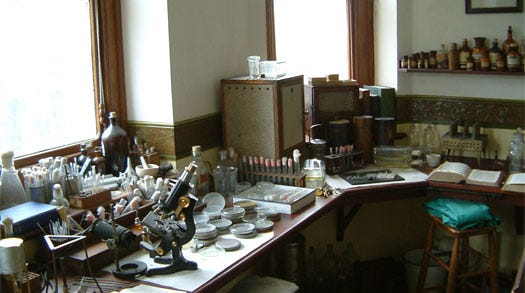Eclectic Letters #6 — Ellen Pasternack
Rilke and lockdown, a surprisingly modern forgotten thriller, a museum of “mould juice”, fried lemons, and Georgian folk.
Herbsttag
At this time of year I often think of one of my favourite poems, one that I was introduced to in a German class at university some years ago: Herbsttag (Autumn Day) by Rainer Maria Rilke. Here it is, with my translation:
Herr: es ist Zeit. Der Sommer war sehr groß.
Leg deinen Schatten auf die Sonnenuhren,
und auf den Fluren lass die Winde los.
Befiehl den letzten Früchten voll zu sein;
gieb ihnen noch zwei südlichere Tage,
dränge sie zur Vollendung hin und jage
die letzte Süße in den schweren Wein.
Wer jetzt kein Haus hat, baut sich keines mehr.
Wer jetzt allein ist, wird es lange bleiben,
wird wachen, lesen, lange Briefe schreiben
und wird in den Alleen hin und her
unruhig wandern, wenn die Blätter treiben.//
Lord: it is time. The summer was very long.
Cast your shadow over the sundials,
and let loose winds over the meadows.
Command the final fruits to swell;
grant them two more southerly days,
urge them to completion and chase
the final sweetness into the heavy wine.
Whoever now has no house will build no more.
Whoever is now alone will remain so for a long time,
will wake, read, write long letters,
and wander restlessly this way and that
down the lanes, as the leaves are drifting.
I find this poem a spine-tingling evocation of Autumn as a time of reckoning. Summer was the time for house-building and fruit-swelling; it’s too late now for any of that. The warmth of the sun is about to be stoppered up into bottles and taken down to a cellar for storage.
In particular, it makes me think of Autumn 2020, when “Lockdown Two” was announced. There was a sense (for me at least) that the long, hot, free summer that had just gone had been the time to sort one’s life out — relationships, living situation, jobs — and that if you hadn’t, well, that was a problem. Those who were in a good place with families and significant others could hunker down and be cosy together. But whoever is now alone will remain so for a long time.
At the same time, though, Herbsttag is soberly comforting: there’s something scholarly and romantic about the winter letter-writer, walking around with his coat up against the wind. And who is he writing to? For now, his life may be solitary — but it doesn’t seem unbearably so.
Trio Mandili
Speaking of spine-tingling…
You might already have come across Trio Mandili, as their videos occasionally go semi-viral on Twitter (that’s how I first encountered them a few years ago), and they have a large following on YouTube. Trio Mandili is a band of three young women from Georgia, who perform mostly Georgian folk music in three-part vocal harmony accompanied by a single panduri. I find their stuff absolutely mesmerising, partly because the sound is pleasingly “different” to Western ears, and partly because they make it look so effortless and off-the-cuff (and FUN!). Most of it appears to have been filmed and recorded on a phone camera while just walking around: no fancy microphones, no notes, nothing.
Here’s one of my favourites, a hypnotic droning tune that I could (and frequently do) listen to again and again:
Fleming Museum
Recently I moved into a flat that overlooks St Mary’s Hospital in Paddington. It was in a laboratory in St Mary’s Hospital that penicillin was discovered almost a hundred years ago, when Alexander Fleming noticed bacteria being killed by a fungus that had contaminated one of his petri dishes.
You can visit that very same laboratory today — it’s been reconstructed to be as it was on the morning of the discovery, as part of a tiny museum with a tiny little gift shop, inside the hospital. On a recent visit there, I learned that before the name “penicillin” was coined, the bacteria-killing secretions were initially called “mould juice”. Yum! And if you want to extend your themed excursion, there’s a pub around the corner called the Sir Alexander Fleming where you could stop for a drink.
The Hours Before Dawn
My mother is part of a number of book clubs, including one which only reads books by or about alumni of Somerville College, Oxford. Somerville was Oxford’s first women’s college — though it went co-ed in the 90s — and as a result counts many fantastic 19th- and 20th-century bluestockings amongst its alumni. (One former principal of the college was later revealed to have had a secret career with MI6 for many decades, for which she was nicknamed the “Queen of Spies”!).
Through this book club my mother discovered The Hours Before Dawn by Celia Fremlin, a relatively forgotten 20th-century crime writer, which she then recommended to me. THBD is a thriller about a housewife who, up every night with the baby and delirious with lack of sleep, begins to suspect that the family’s lodger is plotting something sinister.
This plot is an interesting take on the classic thriller trope of “protagonist has obsessive hunch that something is wrong; reader doesn’t know how seriously to take it” (Rebecca, The Turn of the Screw, Rear Window, and many others — not least the Harry Potter series!). I also found it very subversively modern in its commentary on the life of a housewife. Take this passage, for instance:
“Bother! All the eggs would be hard by now, and Margery was the only one who liked them hard. Harriet liked hers soft, and Mark liked his very soft. As to Louise herself, she had long forgotten which way she liked them. It made the housekeeping that much easier if there was one person out of the five whose tastes didn’t have to be considered. To neglect one’s own tastes was more labour-saving than any vacuum cleaner, and it was a form of neglect about which no one would call you to account. Your husband wouldn’t demand buttons on it — your children wouldn’t hurt themselves on it, or be made late for school by it. It wouldn’t pile up against you, like dirty nappies…
Or would it? Louise set the saucepan with a clatter onto the draining-board, and as she did so the years of her future seemed to rattle menacingly about her ears. If you went on neglecting your own tastes like this, did you, in the end, cease to have any tastes? Cease, in fact, to be a person at all, and become merely a labour-saving gadget around the house? Less and less labour-saving, of course, as the years went by — (“My mother? — Oh, you mean that thing that used to do the washing-up so well? Daddy’s thinking of getting a new one…”)
“A new what, Mummy?”
With dismay Louise realised that she must have spoken the last sentence out loud [...]. This was just what was liable to happen when one was half asleep like this.”
Would you have guessed that this was published in 1958?
This reminded me of Hags, Victoria Smith’s excellent book on perceptions of middle-aged women, which I reviewed last year. Smith argues that younger women tend to distance themselves from women of past generations, a form of psychological splitting that allows us to maintain a comfortably familiar view of the world and our place in it. There’s a naive exceptionalism that says: I might age, yes, but I will never be like the frumpy middle-aged women around me today, or those that lived in the past. I’m different. They can’t ever have had as much individuality and self-awareness as I do currently.
To read a 1950s author making many of the same points on motherhood that you might read in a contemporary opinion column is a useful corrective to this tendency. As well as this, THBD is a quick, fun, and surprising read — perfect for the holidays.
Fried lemons
A current favourite recipe is this salad that I came across on Instagram a few months ago:
The star of the show is lemon, cut into slices and fried. This makes the insides disintegrate and the rinds caramelise, and suffuses the oil with an amazing rich, sweet lemony flavour — quite an unusual one, since frying transforms the flavour of a lemon into something rather different. I don’t often try recipes off Instagram but this one really piqued my curiosity, and let me tell you, it did not disappoint: this is truly a delicious dish. The video recommends feta and pine nuts to top the salad; my slightly serendipitous (or inspired?) addition to that is black pudding crumbled over it. Seriously — thank me later.
Ellen Pasternack is a writer and researcher. She currently works for the think tank Civitas, and runs a separate campaign to reduce driving test waiting times, End the Backlog. Before that, she did a PhD in biology. You can read her work here.









A lovely eclectic read!
And just to second your enthusiasm for The Hours Before Dawn - I really enjoyed it: a feminist comic-thriller before its time.
Beautiful writing Ellen!! I would suggest to try adding feta and origano in the fried lemons 🙂